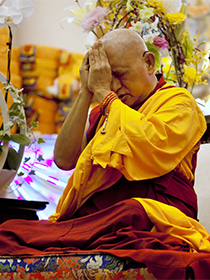- Home
- FPMT Homepage
Foundation for the Preservation of the Mahayana Tradition
The FPMT is an organization devoted to preserving and spreading Mahayana Buddhism worldwide by creating opportunities to listen, reflect, meditate, practice and actualize the unmistaken teachings of the Buddha and based on that experience spreading the Dharma to sentient beings. We provide integrated education through which people’s minds and hearts can be transformed into their highest potential for the benefit of others, inspired by an attitude of universal responsibility and service. We are committed to creating harmonious environments and helping all beings develop their full potential of infinite wisdom and compassion. Our organization is based on the Buddhist tradition of Lama Tsongkhapa of Tibet as taught to us by our founders Lama Thubten Yeshe and Lama Thubten Zopa Rinpoche.
- Willkommen
Die Stiftung zur Erhaltung der Mahayana Tradition (FPMT) ist eine Organisation, die sich weltweit für die Erhaltung und Verbreitung des Mahayana-Buddhismus einsetzt, indem sie Möglichkeiten schafft, den makellosen Lehren des Buddha zuzuhören, über sie zur reflektieren und zu meditieren und auf der Grundlage dieser Erfahrung das Dharma unter den Lebewesen zu verbreiten.
Wir bieten integrierte Schulungswege an, durch denen der Geist und das Herz der Menschen in ihr höchstes Potential verwandelt werden zum Wohl der anderen – inspiriert durch eine Haltung der universellen Verantwortung und dem Wunsch zu dienen. Wir haben uns verpflichtet, harmonische Umgebungen zu schaffen und allen Wesen zu helfen, ihr volles Potenzial unendlicher Weisheit und grenzenlosen Mitgefühls zu verwirklichen.
Unsere Organisation basiert auf der buddhistischen Tradition von Lama Tsongkhapa von Tibet, so wie sie uns von unseren Gründern Lama Thubten Yeshe und Lama Thubten Zopa Rinpoche gelehrt wird.
- Bienvenidos
La Fundación para la preservación de la tradición Mahayana (FPMT) es una organización que se dedica a preservar y difundir el budismo Mahayana en todo el mundo, creando oportunidades para escuchar, reflexionar, meditar, practicar y actualizar las enseñanzas inconfundibles de Buda y en base a esa experiencia difundir el Dharma a los seres.
Proporcionamos una educación integrada a través de la cual las mentes y los corazones de las personas se pueden transformar en su mayor potencial para el beneficio de los demás, inspirados por una actitud de responsabilidad y servicio universales. Estamos comprometidos a crear ambientes armoniosos y ayudar a todos los seres a desarrollar todo su potencial de infinita sabiduría y compasión.
Nuestra organización se basa en la tradición budista de Lama Tsongkhapa del Tíbet como nos lo enseñaron nuestros fundadores Lama Thubten Yeshe y Lama Zopa Rinpoche.
A continuación puede ver una lista de los centros y sus páginas web en su lengua preferida.
- Bienvenue
L’organisation de la FPMT a pour vocation la préservation et la diffusion du bouddhisme du mahayana dans le monde entier. Elle offre l’opportunité d’écouter, de réfléchir, de méditer, de pratiquer et de réaliser les enseignements excellents du Bouddha, pour ensuite transmettre le Dharma à tous les êtres. Nous proposons une formation intégrée grâce à laquelle le cœur et l’esprit de chacun peuvent accomplir leur potentiel le plus élevé pour le bien d’autrui, inspirés par le sens du service et une responsabilité universelle. Nous nous engageons à créer un environnement harmonieux et à aider tous les êtres à épanouir leur potentiel illimité de compassion et de sagesse. Notre organisation s’appuie sur la tradition guéloukpa de Lama Tsongkhapa du Tibet, telle qu’elle a été enseignée par nos fondateurs Lama Thoubtèn Yéshé et Lama Zopa Rinpoché.
Visitez le site de notre Editions Mahayana pour les traductions, conseils et nouvelles du Bureau international en français.
Voici une liste de centres et de leurs sites dans votre langue préférée
- Benvenuto
L’FPMT è un organizzazione il cui scopo è preservare e diffondere il Buddhismo Mahayana nel mondo, creando occasioni di ascolto, riflessione, meditazione e pratica dei perfetti insegnamenti del Buddha, al fine di attualizzare e diffondere il Dharma fra tutti gli esseri senzienti.
Offriamo un’educazione integrata, che può trasformare la mente e i cuori delle persone nel loro massimo potenziale, per il beneficio di tutti gli esseri, ispirati da un’attitudine di responsabilità universale e di servizio.
Il nostro obiettivo è quello di creare contesti armoniosi e aiutare tutti gli esseri a sviluppare in modo completo le proprie potenzialità di infinita saggezza e compassione.
La nostra organizzazione si basa sulla tradizione buddhista di Lama Tsongkhapa del Tibet, così come ci è stata insegnata dai nostri fondatori Lama Thubten Yeshe e Lama Zopa Rinpoche.
Di seguito potete trovare un elenco dei centri e dei loro siti nella lingua da voi prescelta.
- 欢迎 / 歡迎
简体中文
“护持大乘法脉基金会”( 英文简称:FPMT。全名:Foundation for the Preservation of the Mahayana Tradition) 是一个致力于护持和弘扬大乘佛法的国际佛教组织。我们提供听闻,思维,禅修,修行和实证佛陀无误教法的机会,以便让一切众生都能够享受佛法的指引和滋润。
我们全力创造和谐融洽的环境, 为人们提供解行并重的完整佛法教育,以便启发内在的环宇悲心及责任心,并开发内心所蕴藏的巨大潜能 — 无限的智慧与悲心 — 以便利益和服务一切有情。
FPMT的创办人是图腾耶喜喇嘛和喇嘛梭巴仁波切。我们所修习的是由两位上师所教导的,西藏喀巴大师的佛法传承。
繁體中文
護持大乘法脈基金會”( 英文簡稱:FPMT。全名:Found
ation for the Preservation of the Mahayana Tradition ) 是一個致力於護持和弘揚大乘佛法的國際佛教組織。我們提供聽聞, 思維,禪修,修行和實證佛陀無誤教法的機會,以便讓一切眾生都能 夠享受佛法的指引和滋潤。 我們全力創造和諧融洽的環境,
為人們提供解行並重的完整佛法教育,以便啟發內在的環宇悲心及責 任心,並開發內心所蘊藏的巨大潛能 — 無限的智慧與悲心 – – 以便利益和服務一切有情。 FPMT的創辦人是圖騰耶喜喇嘛和喇嘛梭巴仁波切。
我們所修習的是由兩位上師所教導的,西藏喀巴大師的佛法傳承。 察看道场信息:
- FPMT Homepage
- News/Media
-
- Study & Practice
-
-
- About FPMT Education Services
- Latest News
- Programs
- New to Buddhism?
- Buddhist Mind Science: Activating Your Potential
- Heart Advice for Death and Dying
- Discovering Buddhism
- Living in the Path
- Exploring Buddhism
- FPMT Basic Program
- FPMT Masters Program
- FPMT In-Depth Meditation Training
- Maitripa College
- Lotsawa Rinchen Zangpo Translator Program
- Universal Education for Compassion & Wisdom
- Online Learning Center
-
- Prayers & Practice Materials
- Overview of Prayers & Practices
- Full Catalogue of Prayers & Practice Materials
- Explore Popular Topics
- Benefiting Animals
- Chenrezig Resources
- Death & Dying Resources
- Lama Chopa (Guru Puja)
- Lama Zopa Rinpoche: Compendium of Precious Instructions
- Lama Zopa Rinpoche: Life Practice Advice
- Lama Zopa Rinpoche Practice Series
- Lamrim Resources
- Mantras
- Prayer Book Updates
- Purification Practices
- Sutras
- Thought Transformation (Lojong)
- Audio Materials
- Dharma Dates - Tibetan Calendar
- Translation Services
- Publishing Services
- Ways to Offer Support
- Prayers & Practice Materials
-
- Teachings and Advice
- Find Teachings and Advice
- Lama Zopa Rinpoche Advice Page
- Lama Zopa Rinpoche: Compendium of Precious Instructions
- Lama Zopa Rinpoche Video Teachings
- ༧སྐྱབས་རྗེ་བཟོད་པ་རིན་པོ་ཆེ་མཆོག་ནས་སྩལ་བའི་བཀའ་སློབ་བརྙན་འཕྲིན།
- Podcasts
- Lama Yeshe Wisdom Archive
- Buddhism FAQ
- Dharma for Young People
- Resources on Holy Objects
- Teachings and Advice
-
-
*If a menu item has a submenu clicking once will expand the menu clicking twice will open the page.
-
-
- Centers
-
- Teachers
-
- Projects
-
-
-
-
*If a menu item has a submenu clicking once will expand the menu clicking twice will open the page.
-
-
- FPMT
-
-
-
-
-
Be wise. Treat yourself, your mind, sympathetically, with loving kindness. If you are gentle with yourself, you will become gentle with others.
Lama Thubten Yeshe
-
-
-
- Shop
-
-
-
The Foundation Store is FPMT’s online shop and features a vast selection of Buddhist study and practice materials written or recommended by our lineage gurus. These items include homestudy programs, prayers and practices in PDF or eBook format, materials for children, and other resources to support practitioners.
Items displayed in the shop are made available for Dharma practice and educational purposes, and never for the purpose of profiting from their sale. Please read FPMT Foundation Store Policy Regarding Dharma Items for more information.
-
-
Advice from Lama Zopa Rinpoche
6
Some Ways in Which Rinpoche Is Benefiting People
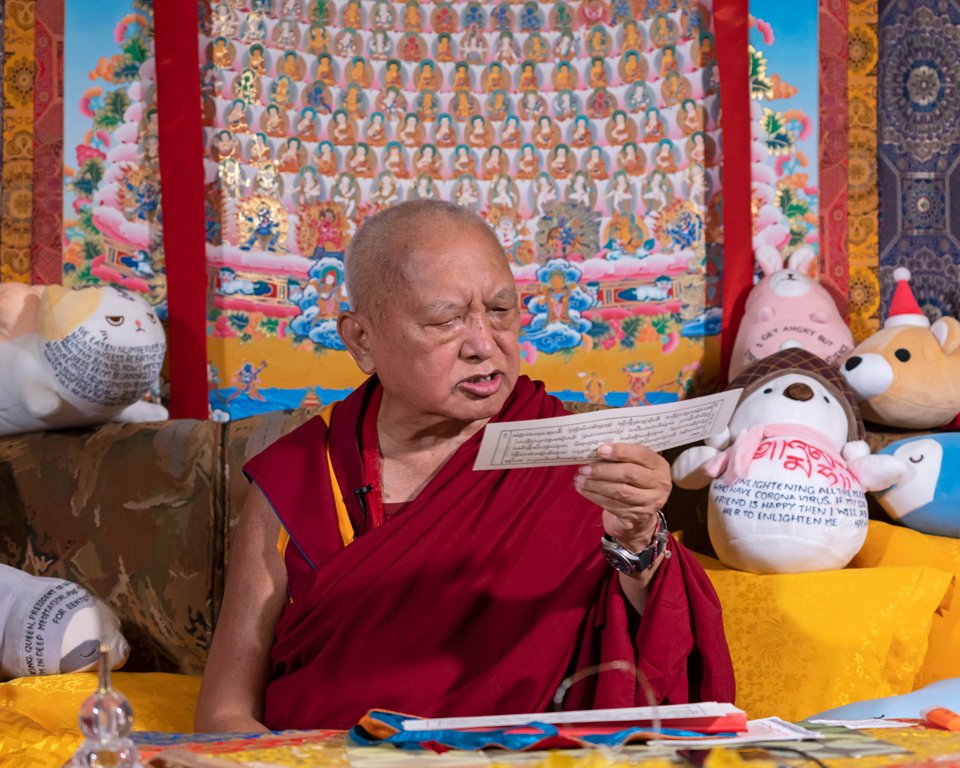
Lama Zopa Rinpoche offering an oral transmission, Kopan Monastery, Nepal, March 2021. Photo by Ven. Lobsang Sherab.
Lama Zopa Rinpoche continues his video teachings on thought transformation from Kopan Monastery in Nepal. Here is a summary of the most recent teaching:
Rinpoche begins this teaching continuing his oral transmission, or lung, of the Sutra of Great Liberation. Before offering the lung, Rinpoche reminds us to have a good motivation: our lives should be beneficial to sentient beings. Therefore, we should stop harming others. And not only that, we should also be working to free others from oceans of samsaric suffering and bring them to full enlightenment by oneself alone. Therefore, we must achieve the state of omniscience. For that reason, we are listening to the teaching on the Sutra of Great Liberation. Just by hearing the lung, we won’t get reborn in the lower realms at all! Even just hearing the name of this sutra, we won’t get reborn in the lower realms! Rinpoche continues the oral transmission at 07:49 in this video.
Rinpoche then discusses some things he is doing that benefit others.
For example, Rinpoche visited a Tibetan home for the elderly in Kathmandu and gave them advice as well as a thangka of the Bodhisattva Kshitigarbha. Rinpoche is also compiling a text for the Kopan monks and nuns to make their lives wise in Dharma practice. This text will include different mantras and instructions according to Rinpoche’s own style and will later be translated into English. Rinpoche is compiling another text for Tibetan lay people with a motivation and various quotations. This text will be a manual for one’s whole life, including getting up, getting dressed, washing, eating, walking, sitting, sleeping, etc., all according to His Holiness the Dalai Lama’s wishes and advice.
Rinpoche gave the motivation and framed holy images to another home for the elderly in Nepal. He also wants to have Namgyalma mantras in every room so that even mosquitoes, ants, and insects get purified while they are in that room. Rinpoche will frame an image of Amoghapasha for the people in the home, which purifies the five heavy negative karmas without break and the negative karma of abandoning holy Dharma. Also, before one dies, if they see Chenrezig (Avalokiteshvara), then this rebirth is the last rebirth for them. If you don’t want suffering, if you don’t like cancer, if you don’t like diabetes, if you don’t like the virus, diarrhea, headaches, if you don’t like any suffering, Rinpoche says, this is what you need to do to be free from samsara.
Rinpoche then makes the point that Buddhists shouldn’t just give the charity of food and shelter to the elderly. We have to offer Dharma to them as well. If you don’t do these things to help the elderly practice Dharma, it is no different than giving an animal food and shelter. You are giving material support, but for the mind—nothing.
We invite you to go deeper into the topics presented here, plus many others, by watching Rinpoche’s video and reading the full transcript of Rinpoche’s teaching.
Watch Lama Zopa Rinpoche’s teaching “Some Ways in Which Rinpoche Is Benefitting People”:
https://youtu.be/eyDan9p4wqM
- Read the transcript of Rinpoche’s teaching
- Find videos with Rinpoche giving the oral transmission of the Sutra of Great Liberatation
- Find Rinpoche’s Teachings on Thought Transformation translated into Spanish, Italian, French, Chinese, and Russian
- Dedication verses for COVID-19 Crisis Teachings
Watch more from the video series Lama Zopa Rinpoche’s Teachings on Thought Transformation during the Time of COVID-19 and find links to videos in transcripts, MP3s, additional practice advice, and more:
https://fpmt.org/fpmt/announcements/resources-for-coronavirus-pandemic/advice-from-lama-zopa-rinpoche-for-coronavirus/
Practice advice from our teachers, Dharma study-from-home opportunities, and more can be found on the page “Resources for the Coronavirus Pandemic.”
Lama Zopa Rinpoche is the spiritual director of the Foundation for the Preservation of Mahayana Tradition (FPMT), a Tibetan Buddhist organization dedicated to the transmission of the Mahayana Buddhist tradition and values worldwide through teaching, meditation and community service.
- Tagged: advice from lama zopa rinpoche, coronavirus, lama zopa rinpoche thought transformation video teaching, oral transmission, supporting elderly, sutra of great liberation, video
5
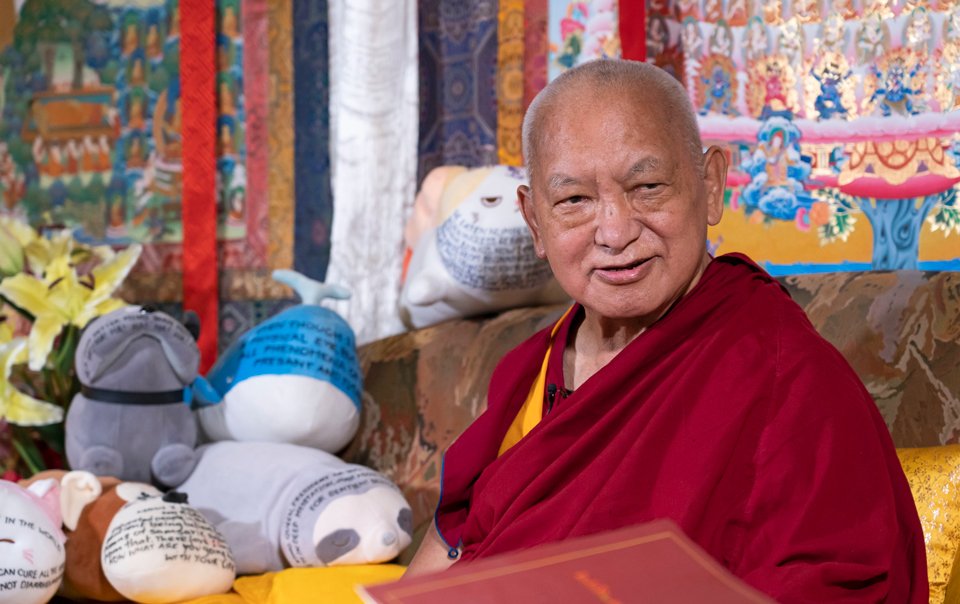
Lama Zopa Rinpoche giving an online teaching, Kopan Monastery, Nepal, March 2021. Photo by Ven. Lobsang Sherab.
Lama Zopa Rinpoche continues his video teachings on thought transformation from Kopan Monastery in Nepal. Here is a summary of the most recent teaching:
Rinpoche begins this teaching suggesting that if we can’t bear our present suffering, we should put a stop to anger, which is the cause of hell. Even the biggest suffering of a human being is great peace compared to a small suffering in hell. The suffering of hell is experienced until one’s non-virtue is finished—we should have the awareness that this is the result of anger.
Rinpoche recommends that we print out this verse (from chapter 6, verse 73) from Shantideva’s Bodhicharyavatara and hang it on our door so we remember:
If I can’t bear even
This much present suffering,
Why don’t I put a stop to anger,
The cause of hell suffering?
Rinpoche then engages in a lively and amusing debate with students in the room about where anger and attachment come from: the brain or the heart. This debate turns into a discussion about lo rig (mind and awareness).
Rinpoche then asks Ven. Fran Mohoupt how long she has been offering service to Kopan. Ani Fran tells Rinpoche it has been twenty-eight years. Rinpoche explains that her helping Kopan in this way is helping Rinpoche as well as serving His Holiness the Dalai Lama and Lama Lhundrup, and benefiting the six-realm sentient beings including tiny insects that the ordinary human eye cannot even see. Rinpoche advises Ani Fran that she shouldn’t think of her work for Kopan as a small thing. Whatever work any of us do at a Dharma center is benefiting the six-realm sentient beings.
We should take refuge and generate bodhichitta before starting any activity at a Dharma center. Any action we do with bodhichitta collects more merit than the sky! Rinpoche then advises that teachers should always begin a session by leading students in generating bodhichitta.
By making even one offering to the Buddha, you won’t get reborn in the lower realms for eons. Making offerings to a holy object is the same amount of merit as making offerings to Buddha—all holy objects are manifestations of buddhas. Because of this, whenever you see a holy object put your hands in the prostration mudra (thumbs tucked inside the palms), then turn your body toward the holy object. This only takes a few seconds and creates as many causes for enlightenment as there are holy objects. Putting your palms together and generating bodhichitta collects much more merit than offering universes filled with jewels to the buddhas. Offering even one water bowl with bodhichitta becomes a cause to free numberless sentient beings from oceans of samsaric suffering. The benefit of everything you do with bodhichitta goes to every single sentient being.
We have to recognize how fortunate we are to be born as human beings. Human life is so precious! Without recognizing this, we make ourselves into a sloth, anteater, or other unfortunate beings. This is the karma of ignorance. It’s not enough to recite mantras, we need to read the lamrim as well. Even if you don’t understand it, reading it leaves so many positive imprints and you can write down questions you have to ask other students or teachers later.
Rinpoche continues with the oral transmission of Sutra of Great Liberation at 1:14:08 of this video.
We invite you to go deeper into the topics presented here, plus many others, by watching Rinpoche’s video and reading the full transcript of Rinpoche’s teaching.
Watch Lama Zopa Rinpoche’s teaching “Everything You Do with Bodhichitta Benefits the Six Realm Sentient Beings“:
https://youtu.be/O4veZJCsW8k
- Read the transcript of Rinpoche’s teaching
- Find videos with Rinpoche giving the oral transmission of the Sutra of Great Liberatation
- Find Rinpoche’s Teachings on Thought Transformation translated into Spanish, Italian, French, Chinese, and Russian
- Dedication verses for COVID-19 Crisis Teachings
Watch more from the video series Lama Zopa Rinpoche’s Teachings on Thought Transformation during the Time of COVID-19 and find links to videos in transcripts, MP3s, additional practice advice, and more:
https://fpmt.org/fpmt/announcements/resources-for-coronavirus-pandemic/advice-from-lama-zopa-rinpoche-for-coronavirus/
Practice advice from our teachers, Dharma study-from-home opportunities, and more can be found on the page “Resources for the Coronavirus Pandemic.”
Lama Zopa Rinpoche is the spiritual director of the Foundation for the Preservation of Mahayana Tradition (FPMT), a Tibetan Buddhist organization dedicated to the transmission of the Mahayana Buddhist tradition and values worldwide through teaching, meditation and community service.
- Tagged: advice from lama zopa rinpoche, anger, coronavirus, lama zopa rinpoche thought transformation video teaching, oral transmission, sutra of great liberation, video
1
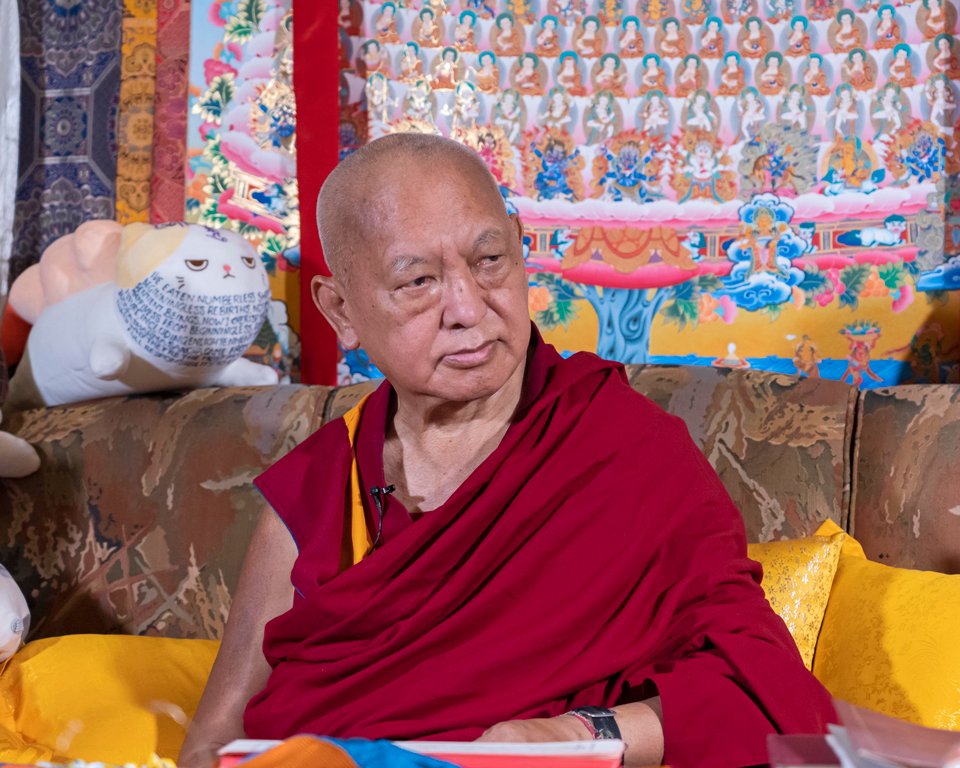
Lama Zopa Rinpoche giving an online teaching, Kopan Monastery, Nepal, March 2021. Photo by Ven. Lobsang Sherab.
Lama Zopa Rinpoche continues offering the oral transmission of the Sutra of Great Liberation in the latest video teachings on thought transformation from Kopan Monastery in Nepal. Here is a summary of the most recent teaching:
Lama Zopa Rinpoche begins this teaching advising that if we are scared of death, the Sutra of Great Liberation is exactly what we need. Even just hearing the name of this sutra frees us from the lower realms. There are unbelievable benefits to hearing and reading this powerful sutra. There are so many things in the world to be frightened of. This sutra is exactly what people need to hear, particularly if you are scared of death and dying.
Offering commentary on chapter 1, verse 4 of Shantideva’s Bodhicharyavatara, Rinpoche explains that if we don’t accomplish benefit with this perfect human rebirth, we won’t receive this opportunity again. Hearing the oral transmission of the Sutra of Great Liberation not only purifies past negative karma, it causes you not to be reborn in the lower realms again.
Taking the oral transmission of this incredible sutra to benefit ourselves is not enough. The real reason we take it is because we are responsible for numberless sentient beings, and the purpose of life is to benefit other sentient beings, even if it’s just one sentient being. We are not only responsible for our friends, or those who please us, but also our enemies. Further, there are numberless universes with numberless sentient beings, and numberless beings are suffering unbelievably in each of the hells. Human beings are suffering with so much ignorance, suffering, and hallucination. Not only that, there are numberless hungry ghosts, numberless animals in the numberless universes, and numberless suras, asuras, and intermediate state beings—we are responsible for them too! Therefore, we take the oral transmission of Sutra of Great Liberation because we need to achieve enlightenment to benefit others. You are listening for everyone! You have to think like that. It is not just for your happiness. Rinpoche explains that he received this oral transmission himself from Kirti Tsenshab Rinpoche.
Rinpoche continues the oral transmission (of the Sutra of Great Liberation where he previously left off, page 111. You can join in the continuation of the oral transmission (20:22 in this video).
While offering the oral transmission, Rinpoche stops to explain that this lineage came from Buddha. There are actually numberless buddhas, but you think, “I am alone! Nobody loves me!” In fact, there are numberless buddhas and bodhisattvas that love you and cherish you. Even the tiniest insect, every single ant—numberless buddhas and bodhisattvas cherish them the most. Therefore, how can you harm them? How dare you hurt them? When you don’t crush them or kill them, this is a small help to them, and also a great offering to the numberless buddhas and bodhisattvas.
Rinpoche also advises that we think that Shakyamuni Buddha or the numberless buddhas are giving you this oral transmission. Because the numberless buddhas became enlightened to benefit you, they are giving you the oral transmission.
Even reciting the mantra from Sutra of Great Liberation has unbelievable benefits. From the time you recite it up until enlightenment, you never get reborn in the lower realms. Unbelievable. Not only that, there are other most unbelievable benefits.
Mantra from Sutra of Great Liberation
NAMO BUDDHĀYA / NAMO DHARMĀYA / NAMAḤ SAṄGHĀYA / ADANTI DHĀRAṆĪ /
TADYATHĀ / AKAŚHANI VĀVĪNI / SARVA DHARMĀ NI VANĪ / IŚHAMANA / VIPAŚHANA/
VIMALA SUPARI / DHARMA NI KHANA / VARUNI CHAYA TAMALE / CHALE / HULU HULU /
ŚHIVITE / MANTRA MANTRA MANTRAḤ SVĀHĀ
We invite you to go deeper into the topics presented here, plus many others, by watching Rinpoche’s video and reading the full transcript of Rinpoche’s teaching.
Watch Lama Zopa Rinpoche’s teaching “The Numberless Buddhas Are Giving You the Oral Transmission“:
https://youtu.be/Z3wzyzJNkVI
- Read the transcript of Rinpoche’s teaching
- Find videos with Rinpoche giving the oral transmission of the Sutra of Great Liberatation
- Find Rinpoche’s Teachings on Thought Transformation translated into Spanish, Italian, French, Chinese, and Russian
- Dedication verses for COVID-19 Crisis Teachings
Watch more from the video series Lama Zopa Rinpoche’s Teachings on Thought Transformation during the Time of COVID-19 and find links to videos in transcripts, MP3s, additional practice advice, and more:
https://fpmt.org/fpmt/announcements/resources-for-coronavirus-pandemic/advice-from-lama-zopa-rinpoche-for-coronavirus/
Practice advice from our teachers, Dharma study-from-home opportunities, and more can be found on the page “Resources for the Coronavirus Pandemic.”
Lama Zopa Rinpoche is the spiritual director of the Foundation for the Preservation of Mahayana Tradition (FPMT), a Tibetan Buddhist organization dedicated to the transmission of the Mahayana Buddhist tradition and values worldwide through teaching, meditation and community service.
- Tagged: advice from lama zopa rinpoche, coronavirus, lama zopa rinpoche thought transformation video teaching, mantra from the sutra of great liberation, sutra of great liberation, video
30
Make Prayers by Means of the Six Remembrances
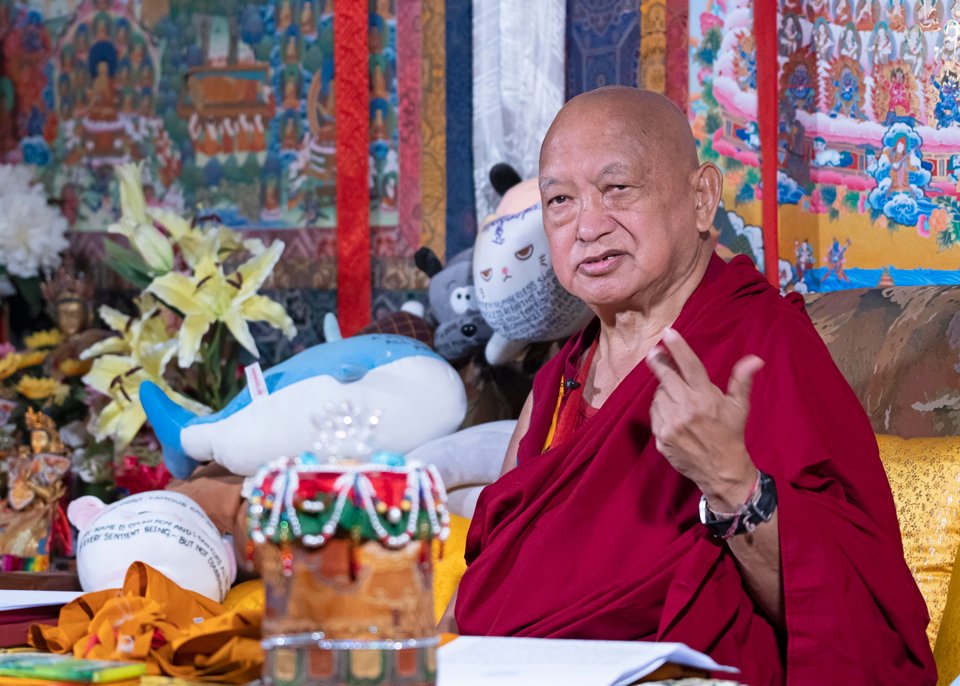
Lama Zopa Rinpoche giving an online teaching, Kopan Monastery, Nepal, March 2021. Photo by Ven. Lobsang Sherab.
Lama Zopa Rinpoche continues his video teachings on thought transformation from Kopan Monastery in Nepal. In this teaching, Rinpoche continues his commentary on the text The Hundred Clear Realizations of the Glorious One from Narthang, which describes how to make offerings and prayers on the anniversary of the passing of the guru. According to the text, in addition to the six remembrances you have as you make offerings, there are prayers you should make. Here is a summary of the most recent teaching:
Lama Zopa Rinpoche begins this teaching reminding us of our motivation for listening to the teachings, which is to free numberless sentient beings from oceans of samsaric sufferings and bring them to the total cessation of obscurations and the completion of realizations—full enlightenment—by oneself alone. Therefore, I must achieve enlightenment. Therefore, I’m going to listen to the teachings.
Rinpoche then continues his advice on what to do on the anniversary of your guru’s passing away by continuing to offer commentary on the text The Hundred Clear Realizations of the Glorious One from Narthang. On this occasion, it’s good to purify mistakes made in relation to the guru. Students should pray that all of the vices created in dependence on the guru are purified.
From the text:
Also for us, the vices that depend on the guru, such as harming the holy body, charging [the guru] money, disobeying the advice, expressing [the guru’s] vices, judging [the guru’s] holy mind, disturbing the holy mind, and so forth; may all this collection of vices, whatever occurred, be purified.
One mistake Rinpoche mentions is when a student gossips about and criticizes the guru’s perceived mistakes to others. By doing so, you are judging the guru’s mind with pride or anger, as if you can understand the level of the guru’s mind. Students should also avoid causing trouble for the holy mind of the guru.
On the anniversary of the guru’s passing away, one example of what to do is to pray to meet a perfect virtuous friend in all lifetimes and only please them. If you don’t correctly follow the guru, it is easy to create so much negative karma and the more gurus, the more potential negative karma. So it’s very good to pray to never displease the guru, not even for a second.
Another example from Rinpoche’s commentary on the verses of The Hundred Clear Realizations of the Glorious One from Narthang is to pray to enjoy the liberation story of the virtuous friend. By hearing the story of the guru—their unbelievable dedication and sacrifice—you realize this life has no essence, the guru gave up all the pleasures because samsaric pleasure is only suffering. By hearing their story you are inspired by their renunciation.
For example, the stories of the Sixteen Arhats inspire others to practice, particularly the Sangha. The sixteen arhats are enlightened beings doing the activities of a bodhisattva.
Rinpoche advises that on the anniversary of your guru’s passing it is also good to do the long version of Four Mandala Offerings of Tara Puja. Rinpoche then mentions that this needs to be translated into English.
Rinpoche indicated at the end of the video that he will soon be returning to teaching on the topic of emptiness.
We invite you to go deeper into the topics presented here, plus many others, by watching Rinpoche’s video and reading the full transcript of Rinpoche’s teaching.
Watch Lama Zopa Rinpoche’s teaching “Make Prayers by Means of the Six Remembrances”:
https://youtu.be/8HD90tBlNrA
- Read the transcript of Rinpoche’s teaching
- The Wish-fulfilling Gem Enhancing the Buddha’s Doctrine, a Method for Making Offerings and Prayers to Guru Shakyamuni Buddha and the Sixteen Arhats by Yeshe Gyaltsen
- Find Rinpoche’s Teachings on Thought Transformation translated into Spanish, Italian, French, Chinese, and Russian
- Dedication verses for COVID-19 Crisis Teachings
Watch more from the video series Lama Zopa Rinpoche’s Teachings on Thought Transformation during the Time of COVID-19 and find links to videos in transcripts, MP3s, additional practice advice, and more:
https://fpmt.org/fpmt/announcements/resources-for-coronavirus-pandemic/advice-from-lama-zopa-rinpoche-for-coronavirus/
Practice advice from our teachers, Dharma study-from-home opportunities, and more can be found on the page “Resources for the Coronavirus Pandemic.”
Lama Zopa Rinpoche is the spiritual director of the Foundation for the Preservation of Mahayana Tradition (FPMT), a Tibetan Buddhist organization dedicated to the transmission of the Mahayana Buddhist tradition and values worldwide through teaching, meditation and community service.
- Tagged: advice from lama zopa rinpoche, coronavirus, guru devotion, lama zopa rinpoche thought transformation video teaching, the hundred clear realizations of the glorious one from narthang, video
26
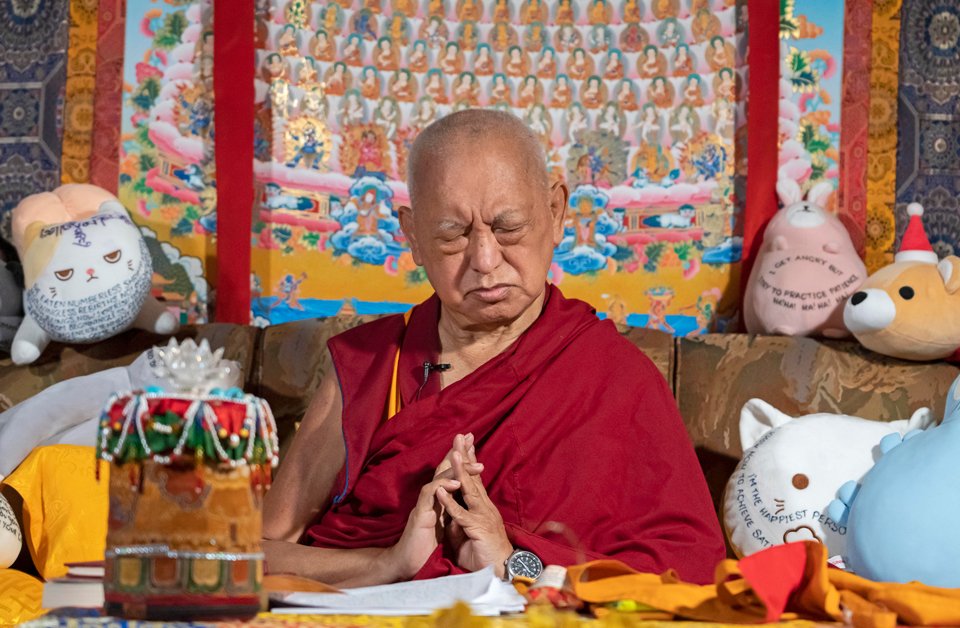
Lama Zopa Rinpoche during a video teaching, Kopan Monastery, Nepal, March 2021. Photo by Ven. Lobsang Sherab.
Lama Zopa Rinpoche continues his video teachings on thought transformation from Kopan Monastery in Nepal. Here is a summary of the most recent teaching:
Lama Zopa Rinpoche begins this teaching discussing the passing of a nun’s father, who died from a heart attack, a month after her mother had died of cancer and COVID-19. Rinpoche reminds us that when we hear about someone passing away it is always good to remember, “I will be the same thing, just a name. All that will be left of me is my name. That’s it, nothing else.” Anytime this can happen, Rinpoche says, and it’s very important to remember.
Even Buddhists don’t practice mindfulness of death, Rinpoche explains. You can discuss emptiness and study philosophy, but the basic first Dharma practice is renouncing attachment to this life and remembering death and impermanence. Even elderly people are shocked that they are going to die. When people you know die, it is an incredibly powerful teaching, reminding you that you can die at any time. If you don’t prepare now, it will be difficult for your mind to be happy when your breath stops.
From Verses of Advice for Meditating on Impermanence by Gungthang Tenpai Dronme:
If, while you have control over your life,
You don’t establish a firm basis for lasting happiness,
When the coming and going of your breathing stops,
It will be difficult for your mind to be happy.
Remembering death and impermanence brings you to Dharma. Even if you make offerings of lunch to hundreds of Maudgalypus and Sharipus, remembering death and impermanence for one second is better than that. Offering lunch won’t make you immediately lose the concept of permanence and remind you of Dharma. Buddha’s very last teaching was impermanence.
Rinpoche then reminds us of our motivation for listening to the teachings. We have total responsibility to free numberless sentient beings from oceans of samsaric sufferings and bring them to peerless happiness, the total cessation of gross and subtle obscurations and the completion of realizations. So you should think, “Therefore, I must achieve enlightenment to do that perfectly, without the slightest mistake. For that reason, I’m going to listen to the teachings.”
Rinpoche then explains that when our guru passes away we should follow the advice Rinpoche gave in his previous teaching, which is engaging in the six remembrances and doing pujas and practices, including Lama Chopa Tsog. This is incredible purification. If you have any negative karma collected with the guru, it is the greatest purification, and you collect the most extensive merits.
Rinpoche then continues his commentary on The Hundred Clear Realizations of the Glorious One from Narthang starting on page 7 of the teaching’s transcript. One point Rinpoche makes very strongly is that when we make offerings to the Sangha or lay people who are disciples of our own guru, we should think that we are making offerings to the guru’s own pores. First, generate bodhichitta, Ripoche says. Then whatever you are offering, to however many disciples of your guru, think, “I’m making offerings to each pore of my guru.” By doing this, you collect much more merit than if you had made offerings to numberless Buddhas, Dharma, and Sangha, and numberless statues, stupas, or scriptures. Even if you have a billion dollar business—that is nothing compared to doing this.
Rinpoche shares a story about how he offered money to monks in Tibet while thinking they were his root guru. Rinpoche shared that he visualized each monk as his guru while making the offerings.
Rinpoche then offers commentary on these verses from The Hundred Clear Realizations of the Glorious One from Narthang on how to offer and dedicate your roots of virtue to the guru (pages 11-15 of the transcript):
With strong devotion and respect for your guru, think that immeasurable buddhas and bodhisattvas are abiding as your witnesses.
All buddhas and bodhisattvas abiding in the ten directions, please think of me.
Sangha, please think of me.
By our making offerings to the Rare Sublime Ones; offering service to the Sangha, those intent on virtue; giving tormas to the bhutas; taking vows; doing recitations; accomplishing listening, reflecting, and meditating, and so forth; all these roots of virtue of however many merits of virtue and merits of transcendental wisdom have been collected—made into one and combined together, and then added together—we offer to our guru, the perfect virtuous friend, Gelong/Bodhisattva (insert his/her name), along with the lineage of the Father and Sons.
By making this offering, may the holy views of the gurus, the virtuous friends, be completed more and more. May all objects of abandonments of the graduated paths and bhumis, the obstacles, and the obscurations whatsoever be purified.
By proceeding gradually in the five paths and ten bhumis, may we and others achieve full enlightenment quickly for the sake of all sentient beings.
We invite you to go deeper into the topics presented here, plus many others, by watching Rinpoche’s video and reading the full transcript of Rinpoche’s teaching.
Watch Lama Zopa Rinpoche’s teaching “Make Offerings Thinking You Are Offering Them to Your Guru’s Pores“:
https://youtu.be/CCU8bVf7G9w
- Read the transcript of Rinpoche’s teaching
- Lama Chopa and Tsog Offering: A Method of Practice According to the Instructions of Lama Zopa Rinpoche
- Find Rinpoche’s Teachings on Thought Transformation translated into Spanish, Italian, French, Chinese, and Russian
- Dedication verses for COVID-19 Crisis Teachings
Watch more from the video series Lama Zopa Rinpoche’s Teachings on Thought Transformation during the Time of COVID-19 and find links to videos in transcripts, MP3s, additional practice advice, and more:
https://fpmt.org/fpmt/announcements/resources-for-coronavirus-pandemic/advice-from-lama-zopa-rinpoche-for-coronavirus/
Practice advice from our teachers, Dharma study-from-home opportunities, and more can be found on the page “Resources for the Coronavirus Pandemic.”
Lama Zopa Rinpoche is the spiritual director of the Foundation for the Preservation of Mahayana Tradition (FPMT), a Tibetan Buddhist organization dedicated to the transmission of the Mahayana Buddhist tradition and values worldwide through teaching, meditation and community service.
- Tagged: advice from lama zopa rinpoche, coronavirus, guru devotion, lama zopa rinpoche thought transformation video teaching, the hundred clear realizations of the glorious one from narthang, video
23
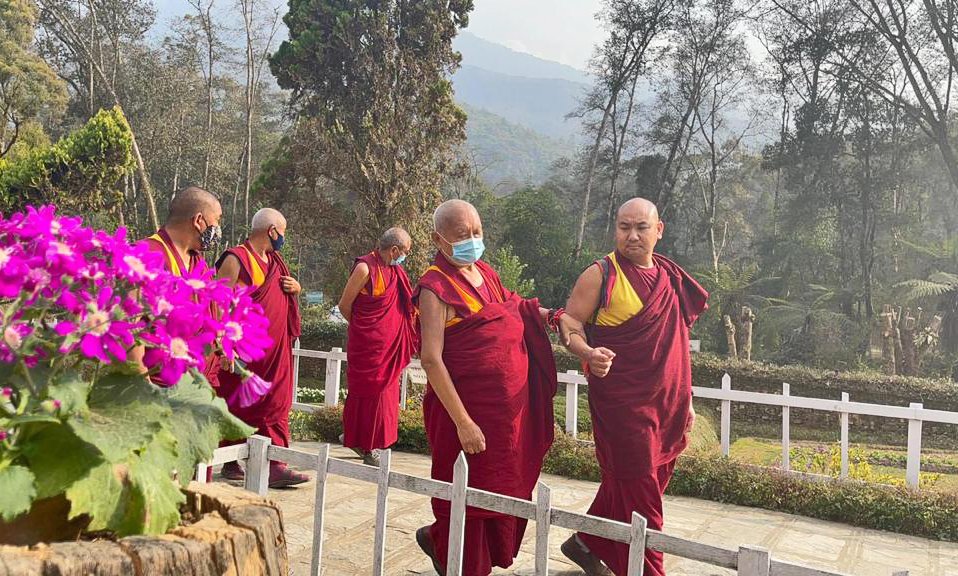
Lama Zopa Rinpoche walking in a Heruka holy place, where he had invited young monks for a picnic and offered tsog, Nepal, February 2021. Photo by Geshe Thubten Jangchub.
In the following short excerpt from Lama Zopa Rinpoche’s video teachings on thought transformation, Rinpoche explains that we live our whole life with the hallucination that the I exists from its own side, that it is a real I. Basic Buddhism is about discovering the self, discovering that the way the I, or self, appears is a total hallucination. Buddhism is not just about chanting rituals, Rinpoche says, it is for learning about our life!
Watch the three and a half minute video “Basic Buddhism Is Discovering Your Self”:
https://youtu.be/KZjn6g-xKSQ
Here is the transcript of Rinpoche’s teaching in this short video:
Of course, basically, it is dagdzin marigpa, the ignorance grasping the I. That which exists in mere name, but then it appeared and you believed with a wrong view as a real I, truly existing, existing from its own side, a real I. You live the whole… You do everything, every single [action] of your body, speech, and mind, every activity, you lead the whole entire life with this wrong concept and with this wrong view, this hallucination. You live the life; you do every single thing with this hallucination, believing it is real, believing everything is real. Real! You do everything, believing it is real, [believing] the hallucination is real, with the concept that it is real. You do everything. Wow, wow, wow. Amazing.
That, that is the basic, the very basic Buddhism—discovering your self! Discovering your self! Aaaah. Aaa-ah. You see? What is false in your life, what is truth in your life—oh, that is discovering your self. From beginningless rebirths up to now, how you have been believing your self, how things appear to your mind, is toooooooootally opposite. This is a hallucination. Aaaah. You have to realize this. That is the most important thing. It is basic Buddhism! Aaaah. Aaaah.
Now you really understand what Buddhism is! Aaaah. What Buddhism offers to your life, to learning about your life! Aaaah. You see? You have to recognize that. It is not just chanting blah, blah, blah. No, it is not like that. Not at all. It shows the truth! Aaaah. It is not just chanting blah, blah, blah. Many religions do chanting, making sounds. It is not just that. It is not just that. Now the more you learn now, now you can see what Buddhism is. How it is most important in your life. Aaaah. Like that.
Watch more from the video series Lama Zopa Rinpoche’s Teachings on Thought Transformation during the Time of COVID-19 and find links to videos in transcripts, MP3s, additional practice advice, and more:
https://fpmt.org/fpmt/announcements/resources-for-coronavirus-pandemic/advice-from-lama-zopa-rinpoche-for-coronavirus/
Lama Zopa Rinpoche is the spiritual director of the Foundation for the Preservation of Mahayana Tradition (FPMT), a Tibetan Buddhist organization dedicated to the transmission of the Mahayana Buddhist tradition and values worldwide through teaching, meditation and community service.
- Tagged: advice from lama zopa rinpoche, emptiness, essential extract, essential extract thought transformation teachings, video
22
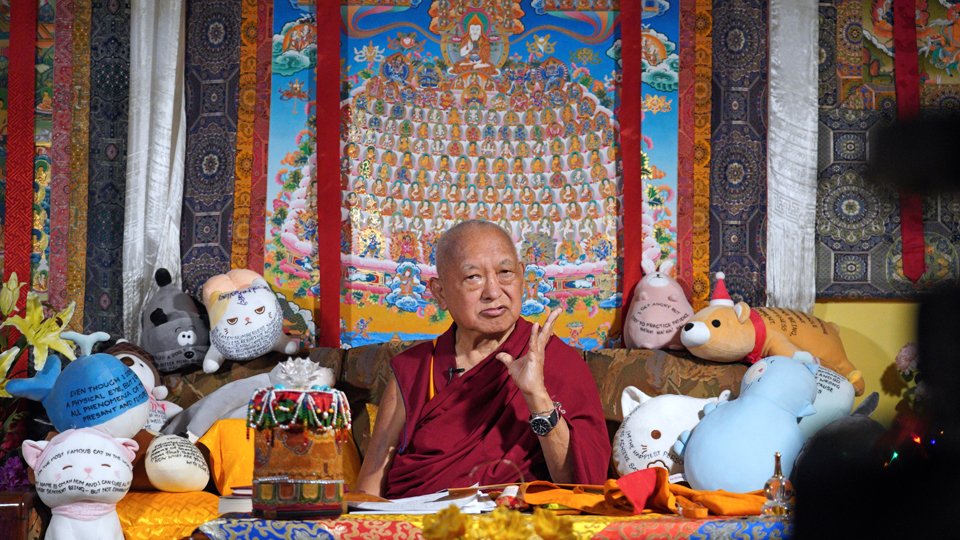
Lama Zopa Rinpoche doing his first video teaching for 2021, Kopan Monastery, Nepal, March 2021. Photo by Ven. Lobsang Sherab.
Lama Zopa Rinpoche continues his video teachings on thought transformation from Kopan Monastery in Nepal. Here is a summary of the most recent teaching:
Rinpoche begins this teaching extending his wishes that he hopes everyone had a nice long break from the teaching series (since December 16, 2020) and that we all are doing very well and using our time in a meaningful and beneficial way.
Rinpoche then extends those same wishes to every hell being, every hungry ghost, and every animal, including even the smallest insects and plankton. Rinpoche then reminds us that we have all been plankton numberless times in past lives. In fact, we have even been viruses numberless times! Rinpoche explains that since these tiny beings spread diseases such as COVID-19, we also have been those tiny beings numberless times, spreading diseases to others from beginningless rebirths. We have also been tigers and tiny biting insects numberless times, harming others, eating others, doing ugly actions, and creating fear.
It’s important to think about karma because it helps to recognize that life is not real, it’s more like a dream. If you think of the karma of being born as those beings in the lower realms, it is impossible to waste even a second of our precious human life distracted by attachment to pleasures of this life. Just like while you are dreaming, you believe everything is real when you are living your life. Only when you wake up, do you realize that everything is not as it appears. One day, when you are getting ready to die, you will realize that this life has been like a dream. Life happens, then is gone. We have to meditate on emptiness to recognize that life is a hallucination. Otherwise, we cheat ourselves every moment of every day by having a completely wrong concept. This is why it is so important to practice holy Dharma, so we don’t cheat ourselves. We have abused ourselves since beginningless rebirths.
Rinpoche then begins teaching us on what to do on the anniversary of our guru’s passing.
First, Rinpoche reminds us of the correct motivation for listening to the teachings, which is for happiness and not suffering. This is not for the temporary happiness of this life or even the happiness of liberation from samsara. The real purpose is to bring all the numberless sentient beings to Buddhahood—the total cessation of obscurations and completion of realizations. In order to do this, we must achieve omniscience. Without that, we can’t do perfect work for others without there being mistakes. We have to have perfect power to reveal the methods to gather sentient beings and complete compassion to embrace every sentient being in every realm. For this reason, we listen to the teachings, to achieve this.
Rinpoche then offers commentary on The Hundred Clear Realizations of the Glorious One from Narthang.
It is extremely meaningful to make offerings on the anniversary of your guru’s passing away, Rinpoche explains. You collect far greater merit by making offerings to the guru then you do by making offerings to all the three-time buddhas.
There are six benefits of making offerings on the anniversary of your guru’s passing away. The Hundred Clear Realizations of the Glorious One from Narthang offers the great Kadampa geshe Sharawa’s citation from Guhyasamaja and Vairochana’s Net of Magical Illusion:
- You complete your guru’s holy wishes.
- You purify the negative karmas and obscurations collected in dependence on the guru.
- You achieve extensive merits.
- In future lives, you meet gurus.
- You become an object to be subdued by gurus.
- You quickly cease your samsara.
Rinpoche offers commentary on each of these points and you can read this commentary in detail in the transcript of this teaching, starting at page 13.
When you make these offerings, you make them with the six remembrances:
- Remembering the aspect of the guru’s holy body when he was alive.
- Remembering that, first, after taking ordination, [your guru] was precise in the three higher trainings, and remember the qualities of the holy mind of [possessing] the transmitted teachings and direct realizations.
- Remembering the liberation stories of the divine teaching lineage of Great Jowo [Atisha], the Dharma tradition of great capable beings, which is not shared with other systems of the great charioteers.
- Remembering [the guru’s] kindness, thinking that all the perfections of samsara and beyond samsara, such as your own happiness, come from the guru.
- Remembering [the guru’s] blessing, thinking that everything you wish, such as being able to think of Dharma, is the blessing of the guru.
- Remembering to devote yourself [to the guru], imagining and bringing to mind that the guru and Buddha are not different.
Rinpoche offers commentary on each of these points, and we recommend following along in the transcript starting on page 17.
We invite you to go deeper into the topics presented here, plus many others, by watching Rinpoche’s video and reading the full transcript of Rinpoche’s teaching.
Watch Lama Zopa Rinpoche’s teaching “Make Offerings on the Anniversary of Your Guru’s Passing Away”:
https://youtu.be/Zh__457vmZs
-
- Read the transcript of Rinpoche’s teaching
- Find Rinpoche’s Teachings on Thought Transformation translated into Spanish, Italian, French, Chinese, and Russian
- Dedication verses for COVID-19 Crisis Teachings
Watch more from the video series Lama Zopa Rinpoche’s Teachings on Thought Transformation during the Time of COVID-19 and find links to videos in transcripts, MP3s, additional practice advice, and more:
https://fpmt.org/fpmt/announcements/resources-for-coronavirus-pandemic/advice-from-lama-zopa-rinpoche-for-coronavirus/
Practice advice from our teachers, Dharma study-from-home opportunities, and more can be found on the page “Resources for the Coronavirus Pandemic.”
Lama Zopa Rinpoche is the spiritual director of the Foundation for the Preservation of Mahayana Tradition (FPMT), a Tibetan Buddhist organization dedicated to the transmission of the Mahayana Buddhist tradition and values worldwide through teaching, meditation and community service.
- Tagged: advice from lama zopa rinpoche, coronavirus, guru devotion, lama zopa rinpoche thought transformation video teaching, the hundred clear realizations of the glorious one from narthang, video
16
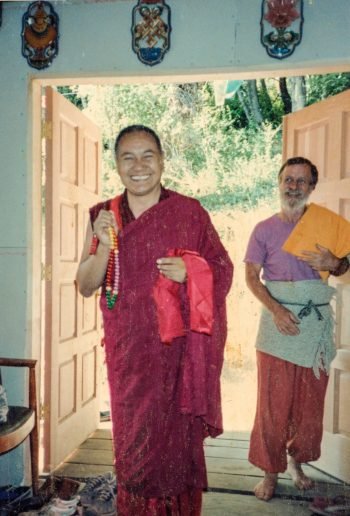
Lama Yeshe with Åge Delbanco, photo courtesy of Nicholas Ribush on Facebook
Lama Zopa Rinpoche requests for students who read obituaries belonging to members of our precious spiritual community, to please pray in the following manner: “May this person never ever be reborn in the lower realms and at the time of death be born in a pure land where they can be enlightened or to receive a perfect human body, meet the Mahayana teachings, and meet a perfectly qualified guru and by only pleasing the gurus mind, achieve enlightenment as quickly as possible.” Reading obituaries also helps us reflect upon our own death and rebirth and thus use our lives in the most meaningful way.
Åge Delbanco, who died on February 19, 2021, in California, US, was one of the earliest Western students of Lama Yeshe and Lama Zopa Rinpoche. Known by his nickname Babaji, he lived at Kopan in Nepal from 1970 to 1973. Even though Åge was from Denmark, California became his home. He became very involved at Vajarpani Institute a year after it started and lived there for thirteen years. He also served as an assistant to Lama Yeshe in 1983, when Lama Yeshe lived in the Santa Cruz-area for three months.
Åge died peacefully in his home in Santa Cruz at the age of 95, after a year of declining health. He had two close friends sitting with him as he passed, who provided him with Dharma support as he transitioned, reading prayers and practices from Lama Zopa Rinpoche’s book How to Face Death without Fear.
Lama Zopa Rinpoche sent a twenty-minute audio message after learning of Åge’s death. Here a short excerpt from Rinpoche’s message:
“So, please everybody pray for Babaji, who just passed away. Please everybody pray, especially the old students who knew him, thank you very, very much, and to not be reborn in lower realms. …
“Due to all the three time merits collected by oneself, three time merits collected by numberless sentient beings, numberless buddhas, may the Babaji be reborn in the pure land where he can be enlightened. Or, then he receives perfect human rebirth, meet Mahayana teachings, meet perfectly qualified Mahayana teacher, revealing the unmistaken path to enlightenment. And by pleasing most the holy mind of the Virtuous Friend, and then he achieve enlightenment as quick as possible.
“So please pray, at least like that. Thank you very much. Thank you very much. Babaji passing away is a teaching for us, teaching for us, reminding us of impermanence and death for ourself, and the need to make preparation for death, emphasizing to practice Dharma, without being lazy, and without the mind being distracted by attachment and anger.
“So yeah, to practice Dharma, to practice bodhichitta is the heart, and then, okay, thank you very much.”
Listen to the audio recording of Lama Zopa Rinpoche on the Death of Åge Delbanco:
An unedited transcript of the recording is available.
Rinpoche says this is the most critical time for a student, when we will all need the most help and support to avoid the lower realms and have a good rebirth. This is the time when students need to help each other. As soon as you hear of someone’s death, without hesitation, you can at least recite one mala of OM MANI PADME HUM. And then, according to one’s ability and availability, there are many other prayers and practices recommended for this purpose: https://fpmt.org/death/
Read a Mandala interview with Åge Delbanco from 2012.
Lama Zopa Rinpoche is the spiritual director of the Foundation for the Preservation of Mahayana Tradition (FPMT), a Tibetan Buddhist organization dedicated to the transmission of the Mahayana Buddhist tradition and values worldwide through teaching, meditation and community service.
10
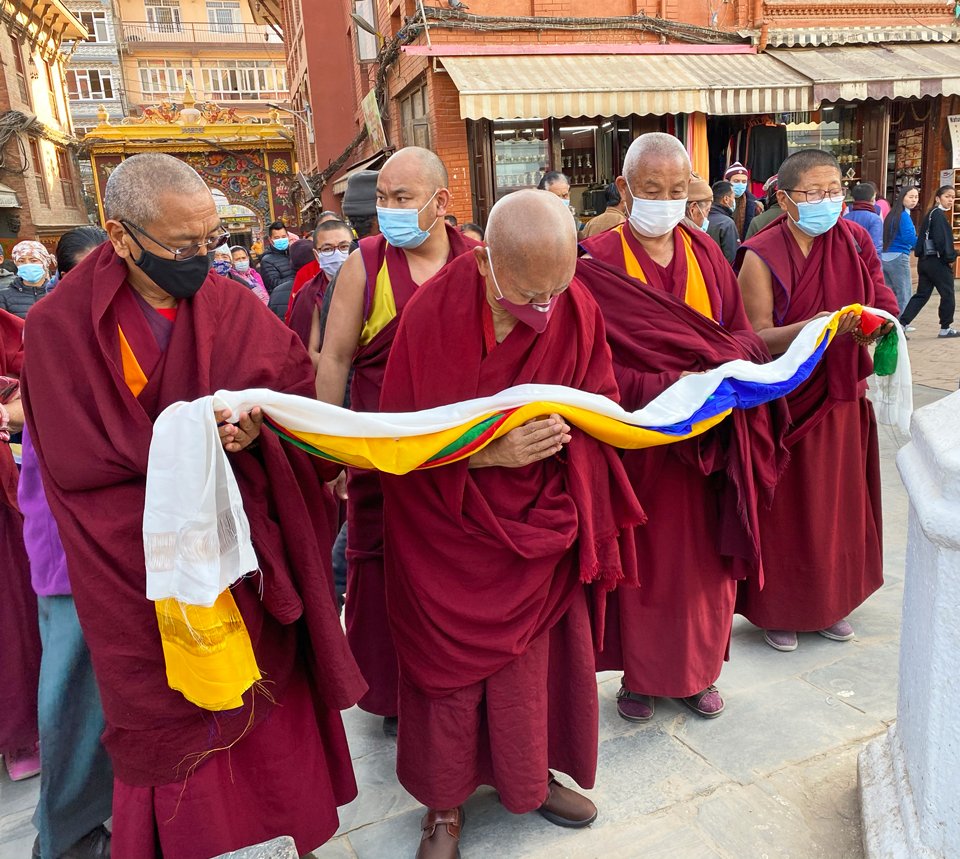
Khen Rinpoche Geshe Chonyi, Lama Zopa Rinpoche, Gen Tenpa Choden, and Ani Jangsem offering five-colored khata to the Boudha Stupa with prayers, Nepal, February 2021. Photo by Ven. Roger Kunsang.
In the following excerpt from Lama Zopa Rinpoche’s video teachings on thought transformation, Rinpoche explains that every single holy object is the basis for you to create all the merits that bring every success and pleasure that you experience now, as well causing your future liberation and enlightenment. All these holy objects came from every single sentient being, including the tiniest ant. Therefore, they are all sooooo precious, much more precious to us than millions of dollars. Whether a person is Buddhist or not, just seeing a holy object allows them to create soooo much merit.
If you put your hands together in prostration when you see a holy object, as well as offering lights and flowers rather than just thinking, “This is just a statue or painting,” you create even more merits than if you were to just see it.
Rinpoche explains that your motive for every daily activity should be only to benefit every living being and bring them to enlightenment. Getting up in the morning, dressing, eating breakfast, taking medicine, working, studying, meditating, and so forth, all should be done with the wish to benefit every single living being, including the tiniest insect.
Then you’ll have such a happy life, Rinpoche explains. You’ll have no regrets now, and when you die and in your future lives, you’ll achieve every success and realization, especially being able to benefit so many sentient beings. You should realize that you’re soooooo fortunate! This awareness will persuade you to create as much merit as possible.
Watch the eighteen minute video “Every Holy Object Comes from Every Sentient Being”:
https://youtu.be/sEqLVPQU7uA
Here is the transcript of Rinpoche’s teaching in this video:
Not Only Buddha, Dharma, and Sangha but Every Single Holy Object Comes from Every Sentient Being
Even the holy objects, not only Buddha, Dharma, and Sangha, but even every single holy object came from every insect, every human being. Not only every Buddha, Dharma, and Sangha came from them, but every statue, stupa, scripture—with which we create every single merit, the cause of happiness, the cause of enlightenment—came from them. We received [every single merit] from them, from every sentient being, every insect, every ant, every mosquito, every hell being, every hungry ghost, every animal, every human being, every sura being, every asura being, every sentient being. So they are the most precious.
Just by Seeing a Painting or Statue of a Buddha You Collect Numberless Greater Merits Than by Making Offerings to Solitary Realizer Arhats Equaling the Atoms of the Whole Entire Universe
[Sutra of the Mudra Developing the Power of Devotion says:འཇམ་དཔལ་རིགས་ཀྱི་བུའམ། རིགས་ཀྱི་བུ་མོ་གང་ལ་ལ་ཞིག་གིས་བསྐལ་པ་གངྒཱའི་ཀླུང་གི་བྱེ་མ་སྙེད་དུ་འཇིག་རྟེན་གྱི་ཁམས་ཐམས་ཅད་ཀྱི་རྡུལ་སྙེད་ཀྱི་རང་སངས་རྒྱས་དག་ལ་ཉིན་གཅིག་བཞིན་དུ་ལྷའི་ཟས་རོ་བརྒྱ་དང་ལྡན་པ་བྱིན་པ་དང་། དེ་བཞིན་དུ་ལྷའི་གོས་རྣམས་སྦྱིན་པ་བྱིན་པ་བས། འཇམ་དཔལ་རིགས་ཀྱི་བུའམ། རིགས་ཀྱི་བུ་མོ་གཞན་གང་ཞིག་གིས་སངས་རྒྱས་རི་མོར་བྲིས་པའམ། གཟུགས་སུ་བྱས་པ་མཐོང་ན། འདི་ནི་དེ་བས་བསོད་ནམས་ཆེས་གྲངས་མེད་པར་སྐྱེད་ན། ཐལ་མོ་སྦྱོར་བ་འམ། མེ་ཏོག་གམ། བདུག་པའམ། སྤོས་སམ། མར་མེ་འབུལ་བ་ལྟ་ཅི་སྨོས་ཏེ། འདི་ནི་དེ་བས་ཆེས་བསོད་ནམས་གྲངས་མེད་པར་སྐྱེད་ཏེ། ཞེས་གསུངས་སོ།
Jam päl rig kyi bu’am / rig kyi bu mo gang la la zhig gi käl pa gang gäi lung gi je ma nye du jig ten gyi kham tham chä kyi dül nye kyi rang sang gyä dag la nyin chig zhin du lhäi zä ro gya dang dän pa jin pa dang / de zhin du lhäi gö nam jin pa jin pa pä / jam päl rig kyi bu’am / rig kyi bu mo zhän gang zhig gi sang gyä ri mor dri pa’am / zug su jä pa thong na / di ni de wä so nam chhe drang me par kye na / thäl mo jor wa am / me tog gam / dug pa’am / pö sam / mar me bül wa ta chi mö te / di ni de wä chhe sö nam drang me par kye te / zhe sung so
Buddha said, “Manjushri, a boy or girl of the race, for eons equaling the sand grains of the River Ganga, offers divine food of a hundred tastes and, likewise, divine dress every day to solitary-realizer buddhas equaling the atoms of the whole entire universe, but, Manjushri, any other boy or girl of the race who sees a painting or statue of a buddha collects numberless greater merits. What need is there to mention that anyone who puts their palms together or offers flowers, scent, incense, or lights collects numberless greater merits than that?”]
So, there it says, if you see, just by seeing—it doesn’t matter whether you have devotion or non-devotion [or whether] you are a Buddhist or not—just by seeing a statue of Buddha or a painting of Buddha, just by that, just by seeing it, you create faaaaar more numberless, numberless greater merits, greater merits, but numberless, you create than the next one. You have to understand it well! [Than] for a hundred, for, I think, a hundred eons. I think that but I don’t [remember]. You get faint [when you understand for how many] eons. But for how many eons? According to the number of sand grains, the sand grains of the River Ganga, the Indian River Ganga. According to the number of… Eons, how many eons? According to the number of the sand grains of the River Ganga. I always forget that one.
By Putting Your Hands Together and Making Offerings to a Painting or Statue of a Buddha You Collect Numberless Greater Merits Than by Seeing It
Then it says, then it says, thäl mo jor wa am, “if you put the palms together like this or offer flowers or incense,” “scented smell or incense,” powder incense, stick incense, scented smell, incense stick, “or light….” Before I was telling [this to] the people who are offering water bowls here, so I was adding “water bowls.” It doesn’t mention water bowls but it is the same for everything. It can fit all the offerings. Before, I mentioned it before they left. I think before the last one left.[1] [If you offer] water bowls, no question, [you collect] even greater merit and numberless times than seeing a painting of Buddha, a picture, or a statue of Buddha. Di ni de wä chhe sö nam drang me par kye te / zhe sung so.
It is most incredible, most incredible, incredible. But many times we don’t know that, so, [we think] “Oh, that’s [just] a statute.” Even if you know it is a statue but you don’t do even this prostration, putting the palms together, you do nothing [due to thinking,] “Oh, that is [just] a statue or stupa.” You collect [so many merits] if you do like this. (Rinpoche shows putting the hands together in prostration.) So just by seeing you collect greater merits than before, all that, just by seeing a painting, picture, or statue. Oh, that is greater merits and numberless! Then, after that, if you do like this (Rinpoche shows putting the hands together in prostration) [you collect] even greater merits than before and numberless! For example, [if you prostrate to] Buddha.
All the Holy Objects Come from the Kindness of Every Single Insect, So They Are So Precious
So, all these holy objects that we see, we see numberless holy objects, statues, stupas, scriptures, they came from this mosquito, by the kindness of this mosquito, this ant, this tiny insect on humid wood. Whatever shape, [such] that it looks like a spider or whatever, [it came from] their kindness. It came from them. Wow, wow, wow. They are soooooo precious. Wow, wow, wow. They are sooooooooooooo precious, sooooooooooooo precious, sooooooooooooo precious. Now I ruin my voice. Now I ruin my voice. I have to save it.
It is incredible, if you know. So, their kindness, they are precious not by qualities as a buddha [is precious] but by their kindness. Aaaah. They are so, so, so precious. They are more precious than the Buddha, Dharma, and Sangha to whom we always pray, as I said before. We get liberated from the lower realms by remembering them (you don’t want to get reborn in the lower realms when you die) and you even get free from samsara and even get free from the lower nirvana, so you get enlightenment, free from suffering and obscurations. So, it all came from every sentient being, every insect. So, they are so precious. Lama khyen, lama khyen.
The Happiness That Comes from Money is Nothing Compared to the Happiness that Comes from Sentient Beings
Why do you think money is so precious, everybody spends the life, in the world people who don’t know, who doesn’t practice pure Dharma, they use their body, speech, and mind, even if human life is so precious, they use their whole life to make money, then they die. They suffer for money.
Now I’m forgetting what I’m saying.
So now I’m using the example of money. Because if we have money we can buy whatever we want, so everybody is working for money for that. But that is nothing. That is nothing. Happiness came from, as I said before, from sentient beings. All your happiness from beginningless rebirths, now, and in the future, temporary and ultimate, liberation and enlightenment, totally, everything came from sentient beings.
Whatever Happiness You Offer Even to a Tiny Insect Is So Important and So Precious
I was telling the monks, so therefore—I’m not going to talk much, just only about emptiness—so I told them that offering service to them, even to a tiny insect, whatever they need you offer, even giving food to the ants, not only to big [animals] but to tiny [ones], whatever you can do to serve them, whatever happiness you can offer to save them from suffering, whatever you can do is sooooooooooooo important, important, important, so precious, so precious. For you, it is so precious. It is most precious for you, so precious, precious, precious. It is so, so important for you, so precious, wow, wow, wow, whoa, anything you can do.
Doing Every Activity in the Service of Other Sentient Beings Is So Important
So, that’s why the motivation is to benefit sentient beings. Then, you get up, get dressed, and eat breakfast to benefit sentient beings, for them to achieve enlightenment, to free them from samsara and achieve enlightenment. To work for them, to benefit them, you are eating breakfast. Then you are going to work with that motivation to benefit sentient beings, to achieve enlightenment for sentient beings so that you can do perfect work. So, for the sentient beings, you are doing your work. Then having lunch. Then you are going, for sentient beings you are going to sleep. For sentient beings, everything is for sentient beings. Even if you are studying, any subject, Dharma or whatever, meditation, everything is for sentient beings. Eating medicine [is for sentient beings].
It is so important. So, it is very important, the service. It becomes service to all sentient beings, to the numberless sentient beings, to every tiny, tiniest insect, to the tiniest ones in the water, the ocean, I don’t remember the name. So, it is like that. You see? It is so important. Whatever you do by changing the motivation [and doing it] for others, then it becomes so, so important. It becomes very important service. It is so important [when you are] doing it for others, as service for others. Even studying Dharma, reflecting, meditation, even eating, sleeping. Then, your life is so happy. Most happy your life is. You have no regret. Now when you die, you are very happy, so satisfied, so happy. And in the future, you are so happy. From life to life, you have great success in benefiting sentient beings, [you have] more realizations, and [you are of] greater benefit to sentient beings. Then your happiness increases life to life and you go towards enlightenment. Wow, wow, wow.
That is okay. Now, the talk.
The Benefits You Get from the Numberless Buddha, Dharma, Sangha, Statues, Stupas, and Scriptures Come from Every Single Sentient Being
So, what I’m saying is that the numberless Buddha, Dharma, Sangha, statues, stupas, and scriptures, which, as I just mentioned, are of so much benefit to you, wow, wow, wow, you receive by every single sentient being, every single insect, the numberless hell beings, hungry ghosts, so sentient beings. Sentient beings are the most precious, most kind, most dear, wish-fulfilling, your wish-fulfilling. [From them come] aaaaaaaaaaaall temporary and ultimate happiness, liberation, enlightenment.
[1] Lama Zopa Rinpoche is referring to several students who helped Ven. Tenzin Namdrol with the water bowls during the lockdown at Kopan Monastery but then left to return to their home countries.
You can find resources and links on the topic of holy objects on the FPMT Education page Holy Objects.
Watch more from the video series Lama Zopa Rinpoche’s Teachings on Thought Transformation during the Time of COVID-19 and find links to videos in transcripts, MP3s, additional practice advice, and more:
https://fpmt.org/fpmt/announcements/resources-for-coronavirus-pandemic/advice-from-lama-zopa-rinpoche-for-coronavirus/
Lama Zopa Rinpoche is the spiritual director of the Foundation for the Preservation of Mahayana Tradition (FPMT), a Tibetan Buddhist organization dedicated to the transmission of the Mahayana Buddhist tradition and values worldwide through teaching, meditation and community service.
- Tagged: advice from lama zopa rinpoche, essential extract, essential extract thought transformation teachings, holy objects, video
2
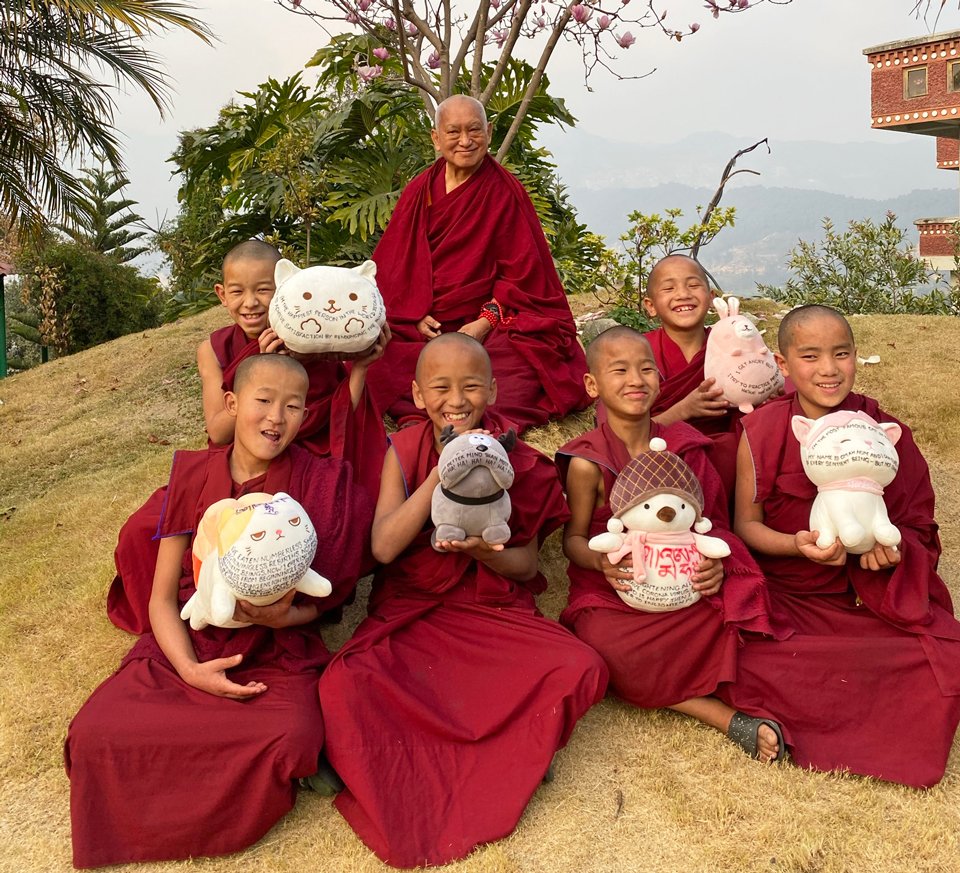
Lama Zopa Rinpoche with young monks and stuffed”friends” with Dharma messages written upon them, Kopan Monastery, February 2021. Photo by Ven. Roger Kunsang.
In an introductory talk at the first Light of the Path retreat in 2009, Lama Zopa Rinpoche explains why everything—good and bad—depends on our mental attitude and why having a good heart wishing to benefit all living beings is so essential. This teachings, which includes stories from Rinpoche’s own early life, is available as the multimedia teaching Everything Depends on Your Attitude. Here is a short excerpt from it:
Our Lives Have Been Most Fortunate
It seems that many old minds have come back to attend this Dharma course, and however our lives have been up to now, that is extremely worthwhile.
I would say that compared to others, our lives have been most fortunate. First of all, many of us have heard the heart of the Buddhadharma, the very essence of the 84,000 teachings of the Buddha, the very precious teaching on the stages of the path to enlightenment (lamrim) many times. We have even heard this from His Holiness the Dalai Lama himself, who is the real living Chenrezig, the Compassion Buddha manifested in the human form of a monk—the aspect that can most perfectly guide us. Just that alone is most amazing and inexpressible. It is the most unbelievable, rare, fortunate, and precious thing that could have happened to us this life.
Then we have met many other great teachers and unbelievably qualified virtuous friends who preserve the whole entire Buddhadharma—the Lesser Vehicle, Mahayana Paramitayana, and Mahayana Tantrayana teachings. Particularly, many of us older students have met and received teachings and initiations from Lama Yeshe, who was kinder than all the numberless past, present, and future buddhas, and whose holy name is extremely rare and difficult to express.
So really, if we look at what has happened to us so far in this life, it is most amazing to have met so many qualified virtuous friends who can reveal the complete path to enlightenment from their own experience. Can you imagine how most unbelievably fortunate our lives have been?
We Can’t Really Tell When Death Will Come
But of course, this incredible opportunity will not last long. It is just like lightning on a very dark night that for a short time reveals everything clearly and is then gone.
Life is not long and we can’t really tell when death will come. There are many conditions for death, like the 400 different types of disease, 360 spirit possessions, 1080 interferers, and these days there are new diseases that were never heard of before like swine flu. (There is no kangaroo flu yet — only pig flu!) Then there is cancer. We hear all the time about this and that friend or family member suddenly getting cancer. Up to now we have been hearing about our family members, friends, students, and others having cancer, but how can you tell that sooner or later other people won’t hear your own name with the word “cancer” next to it and a “has” in between? This happens to many people in the world. Already many older students we have known, who had been studying Dharma for some time, have passed away in different countries. We can never tell. We might be next. That is how life is.
Then there are many other sicknesses. For example, I have diabetes and that brings many symptoms. Sometimes I have been a friend of diabetes and sometimes an enemy. We cannot always live our lives with the concept of permanence, thinking “I am going to live forever.” Well, maybe not “forever”—unless you are on drugs or hallucinating! But anyway, life is very short, and there is not much time left.
Generally, life is very short in degenerate times and even things that are supposed to support life can become the conditions for death. For example, medicines can have side effects leading to death and many people die when their houses collapse or while eating food. …
Rinpoche continues this teaching discussing his experience at the refugee camp Buxa Duar, the early Western supporters and practitioners of Tibetan Buddhism he met in India, the importance of lamrim study and practice, and how we must cultivate the bodhichitta motivation.
Experience Lama Zopa Rinpoche’s entire teaching Everything Depends on Your Attitude in a multimedia format that weaves together video, audio, transcripts, and photos on the topic of one’s motivation, edited by Venerable Sarah Thresher with Megan Evart for the Lama Yeshe Wisdom Archive:
http://multimedia.lamayeshe.com/everything-depends-on-your-attitude
There are more than twenty multimedia presentations from the Lama Yeshe Wisdom Archive for students at any level to explore and deepen their understanding of the teachings of Buddha as shared by Lama Yeshe and Lama Zopa Rinpoche.
Currently, Lama Zopa Rinpoche is taking a break from offering his video series Teachings on Thought Transformation during the Time of COVID-19. Find links to the ninety published videos in this series as well as transcripts, MP3s, additional practice advice, and more:
https://fpmt.org/fpmt/announcements/resources-for-coronavirus-pandemic/advice-from-lama-zopa-rinpoche-for-coronavirus/
Lama Zopa Rinpoche is the spiritual director of the Foundation for the Preservation of Mahayana Tradition (FPMT), a Tibetan Buddhist organization dedicated to the transmission of the Mahayana Buddhist tradition and values worldwide through teaching, meditation and community service.
24
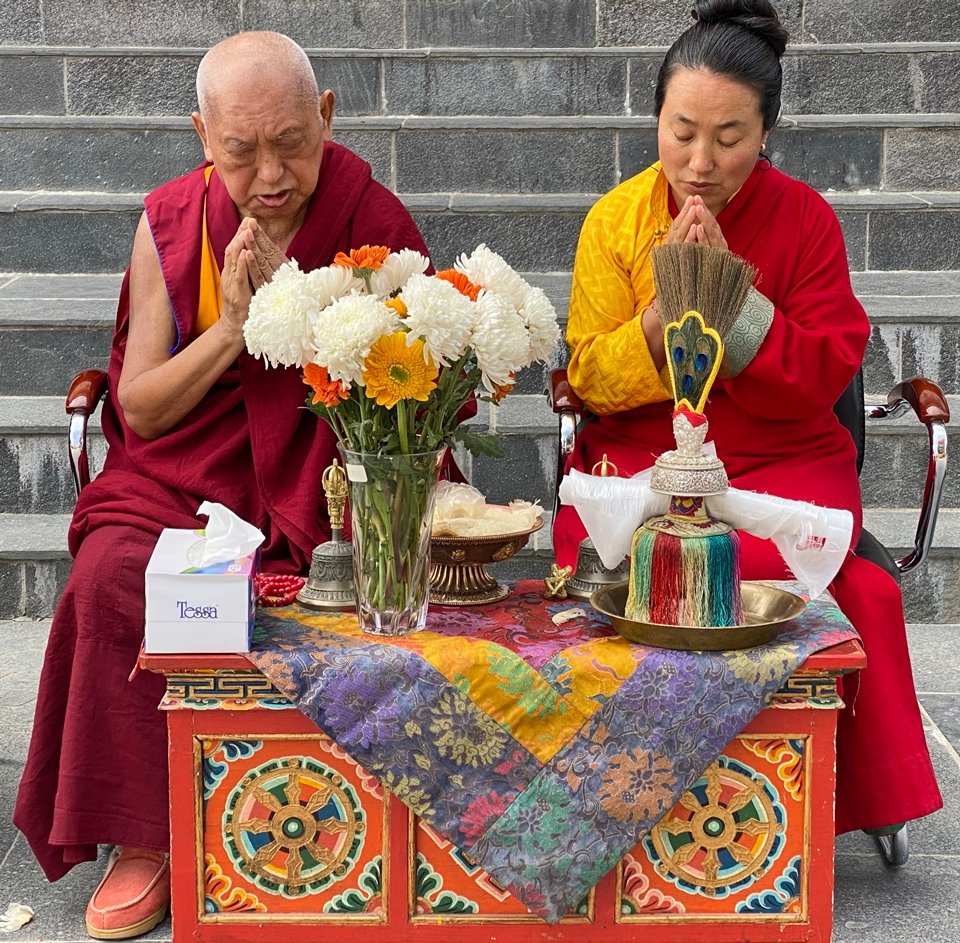
Lama Zopa Rinpoche and Khadro-la during the consecration of large appliqué thangkas of the Twenty-One Taras and the Eight Taras That Save From Fear in the courtyard outside of the main gompa at Kopan Monastery, Nepal, January 2021. Photo by Ven. Roger Kunsang.
The Six Perfections: The Practice of the Bodhisattvas is a recent book from Lama Zopa Rinpoche, in which Rinpoche walks us through this key Mahayana Buddhist teaching. Here’s an excerpt from Rinpoche’s teaching on the perfection of charity:
Keeping our mind pure—free from pride, miserliness, and so forth—is very difficult for ordinary people like us. If we could give simply, without all these disturbing thoughts clouding our giving, our generosity would be perfect and attaining another perfect human rebirth would be easy. But this is a struggle for most of us. That is why we must always check our motivation and be diligent in observing our karma.
The villagers of Solu Khumbu, where I was born, have a very good custom to protect themselves and others. Because they are incredibly poor, theft is always a problem. Things are often stolen: cooking pots, money—even potatoes. In many villages the people bury pots of their precious potatoes outside to keep them safe, but thieves can generally guess where the pots are buried, and they dig them up. Also, sometimes people borrow things and don’t return them, no matter how much the owner complains and shouts.
In such cases of theft, the villagers often go to a monastery and ask the lama there to say prayers and dedicate the merit of the prayer to the thief, totally offering them that thing. Whether or not this becomes a virtuous act does not depend on the lama but on the mind of the victim. If the person can renounce the stolen object completely and offer it to the thief with compassion, then it is virtuous. The owner needs the object, but the thief also needs it, and so by renouncing it and offering it to the thief with compassion, the dedication becomes a virtuous action.
If somebody stole a hundred dollars from us and we cannot do the practice of dedication—if we cannot take the loss upon ourselves and offer the victory to that sentient being; if we still cling to that hundred dollars—how can we perfect the practice of charity? Even without considering how kind that sentient being has been, how precious they are, we should rejoice that they needed something and now they have it. Like us, they want happiness and do not want suffering—in that way they are completely equal to us—so why can’t they have that hundred dollars? If we were to find a hundred dollars, how happy we would be. If we were to find a thousand dollars or a million dollars, we would be so surprised and excited. We would clap our hands with joy. So why can’t we do the same thing for this sentient being who has come across a hundred dollars?
Learn more about The Six Perfections: The Practice of the Bodhisattvas, including order information, on Wisdom Publication’s website or order from the FPMT Foundation Store.
During February 2021, Lama Zopa Rinpoche is taking a break from offering his video series Teachings on Thought Transformation during the Time of COVID-19. Find links to the ninety published videos in this series as well as transcripts, MP3s, additional practice advice, and more:
https://fpmt.org/fpmt/announcements/resources-for-coronavirus-pandemic/advice-from-lama-zopa-rinpoche-for-coronavirus/
Lama Zopa Rinpoche is the spiritual director of the Foundation for the Preservation of Mahayana Tradition (FPMT), a Tibetan Buddhist organization dedicated to the transmission of the Mahayana Buddhist tradition and values worldwide through teaching, meditation and community service.
18
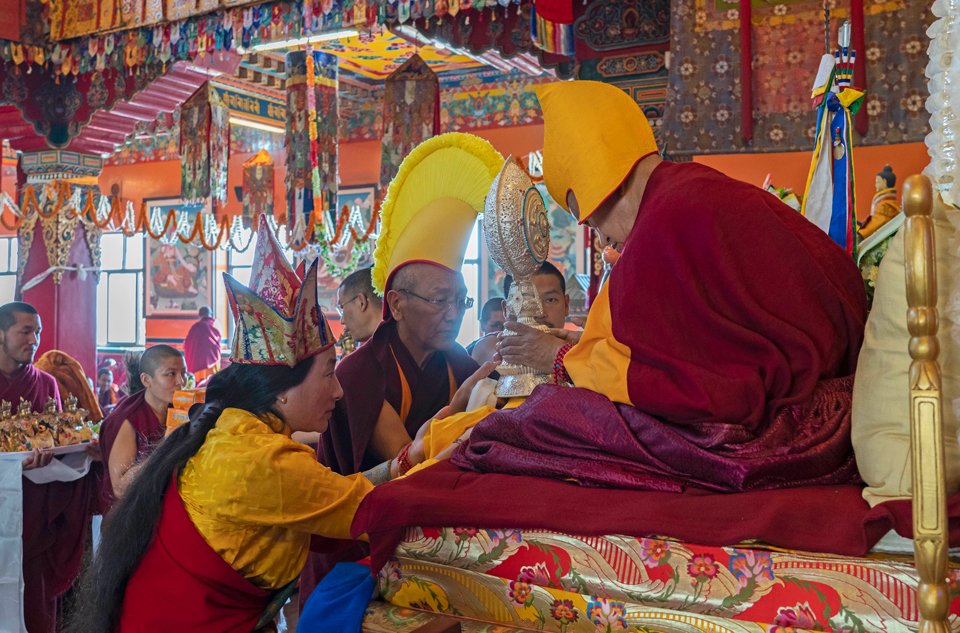
Khadro-la and Khen Rinpoche Geshe Chonyi offering a dharmachakra to Lama Zopa Rinpoche, during a long life puja for Rinpoche, Kopan Monastery, December 2020. Photo by Ven. Lobsang Sherab.
In the following half-hour Essential Extract video, from a teaching Lama Zopa Rinpoche gave in December 2019 at Kopan Monastery, Rinpoche explains the difference between the appearance of our body as a base to be labeled “I,” the label itself, and the mistaken view that this I exists from its own side and that we are the aggregates. He compares this with mistaking a rope at dusk for a snake. Rinpoche emphasizes that everything is empty, but that this does not mean nothing exists. We have to bring the two truths together. For example, when we get angry, we can apply this meditation to realize that the “real I” that gets angry does not truly exist. Then the anger is gone immediately. The same goes for attachment and all delusions. And even birth and death do not exist from their own side. We think we have a “real” son or “real” daughter or “real” wealth. That is impossible, Rinpoche teaches, as there is not even a “real I.”
Watch the video “The ‘Real I’ That Gets Angry Does Not Exist”:
https://youtu.be/Bn7eHOeVU_s
Transcript: Then using the example, the body and mind in your view, the way you think, the way you believe your body and mind is like a piece of rope on the road curled like a snake, different colors and curled. Nang sel … means the way it appears to you, the body and mind are like a piece of rope, a piece of different colored rope curled. That is the appearance, then believing, then you label, because of the way it is curled and the different colors, you see, somebody who doesn’t have clear eyes, shimmering, evening time after sunset, thinks, “Oh, there is a snake.” By labeling “snake” and believing your label, snake, you get frightened. But there is no snake from the tip of the hairs, down to … The piece of the rope, every hair you look at, there is no snake there, but you label [“snake”] because in the evening time, at dusk time, the different colors and the way it is curled, it appears as a snake and then you get fear, terror.
So like that this body and mind are not I. They are not I at all. I told you yesterday or the day before yesterday. You remember I told you? But you label “I” on that and believe that is I, like you label “snake” and the fear comes, like that. It is not I, it is the base to be labeled but not the I.
You remember I mentioned M? There is the base to be labeled “M” and “M” is what is to be labeled. Tag zhi is the base to labeled, and “M” is what is labeled. They are not separate but [they are] two different things. Remember I told you the I and aggregates are two different things but not separate? You must know that, otherwise, you get caught in a hallucination, a wrong concept. You believe the body and mind are I, then all the worry-fear, everything. From that hallucination, wrong concept, hallucination, the ignorance, then all the fear, all the wrong, means all the fear comes.
Then, (Tibetan) then, “you call, you believe that is I, then suffering of pain, suffering of change, pervasive compounding suffering of samsara,” all the sufferings of samsara come in these three, you experience all that suffering. From beginningless rebirths up to now we have been suffering. [That] who made you suffer is the wrong concept, ignorance, believing your body and mind are I. You understand? You should know that. Due to that wrong concept you have suffered from beginningless rebirths. Then again if you don’t realize emptiness in this life, you will suffer again without end. Your wrong concept, ignorance, makes you suffer like by labeling “snake” on a piece of curled rope, then you get all the fear. But the snake you can’t find, it is not there. Like that, the hallucination. That is a very good meditation.
So the different examples how to meditate, there are many. There are many but some I don’t know. I received so many teachings, but due to laziness I didn’t study. I just give you some to meditate on. You understand? The easy ones. Then, that is your wrong concept, ignorance, that makes the suffering of three types—suffering of pain, suffering of change, pervasive compounding suffering—from beginningless rebirth, then again if you don’t realize emptiness, study emptiness, realize emptiness, two truths, [there is that] danger. Therefore, you need to study. You need to meditate. …
Read the complete transcript for this video extract.
Watch more videos from Lama Zopa Rinpoche’s teaching from the 2019 Kopan Course, the annual month-long lamrim course at Kopan Monastery in Nepal:
https://fpmt.org/media/streaming/teachings-of-lama-zopa-rinpoche/kopan-2019/
Find more Lama Zopa Rinpoche Essential Extracts videos:
https://fpmt.org/media/streaming/essential-extracts/
During February 2021, Rinpoche is taking a break from offering his video series Teachings on Thought Transformation during the Time of COVID-19. Find links to the ninety published videos in this series as well as transcripts, MP3s, additional practice advice, and more:
https://fpmt.org/fpmt/announcements/resources-for-coronavirus-pandemic/advice-from-lama-zopa-rinpoche-for-coronavirus/
Lama Zopa Rinpoche is the spiritual director of the Foundation for the Preservation of Mahayana Tradition (FPMT), a Tibetan Buddhist organization dedicated to the transmission of the Mahayana Buddhist tradition and values worldwide through teaching, meditation and community service.
- Tagged: emptiness, essential extract, lama zopa rinpoche, video
- Home
- News/Media
- Study & Practice
- About FPMT Education Services
- Latest News
- Programs
- New to Buddhism?
- Buddhist Mind Science: Activating Your Potential
- Heart Advice for Death and Dying
- Discovering Buddhism
- Living in the Path
- Exploring Buddhism
- FPMT Basic Program
- FPMT Masters Program
- FPMT In-Depth Meditation Training
- Maitripa College
- Lotsawa Rinchen Zangpo Translator Program
- Universal Education for Compassion & Wisdom
- Online Learning Center
- Prayers & Practice Materials
- Overview of Prayers & Practices
- Full Catalogue of Prayers & Practice Materials
- Explore Popular Topics
- Benefiting Animals
- Chenrezig Resources
- Death & Dying Resources
- Lama Chopa (Guru Puja)
- Lama Zopa Rinpoche: Compendium of Precious Instructions
- Lama Zopa Rinpoche: Life Practice Advice
- Lama Zopa Rinpoche Practice Series
- Lamrim Resources
- Mantras
- Prayer Book Updates
- Purification Practices
- Sutras
- Thought Transformation (Lojong)
- Audio Materials
- Dharma Dates – Tibetan Calendar
- Translation Services
- Publishing Services
- Teachings and Advice
- Find Teachings and Advice
- Lama Zopa Rinpoche Advice Page
- Lama Zopa Rinpoche: Compendium of Precious Instructions
- Lama Zopa Rinpoche Video Teachings
- ༧སྐྱབས་རྗེ་བཟོད་པ་རིན་པོ་ཆེ་མཆོག་ནས་སྩལ་བའི་བཀའ་སློབ་བརྙན་འཕྲིན།
- Podcasts
- Lama Yeshe Wisdom Archive
- Buddhism FAQ
- Dharma for Young People
- Resources on Holy Objects
- Ways to Offer Support
- Centers
- Affiliates Area
- Teachers
- Projects
- Charitable Projects
- Make a Donation
- Applying for Grants
- News about Projects
- Other Projects within FPMT
- Support International Office
- Projects Photo Galleries
- Give Where Most Needed
- FPMT
- Shop
Translate*
*powered by Google TranslateTranslation of pages on fpmt.org is performed by Google Translate, a third party service which FPMT has no control over. The service provides automated computer translations that are only an approximation of the websites' original content. The translations should not be considered exact and only used as a rough guide.Superficial observation of the sense world might lead you to believe that people’s problems are different, but if you check more deeply, you will see that fundamentally, they are the same. What makes people’s problems appear unique is their different interpretation of their experiences.







